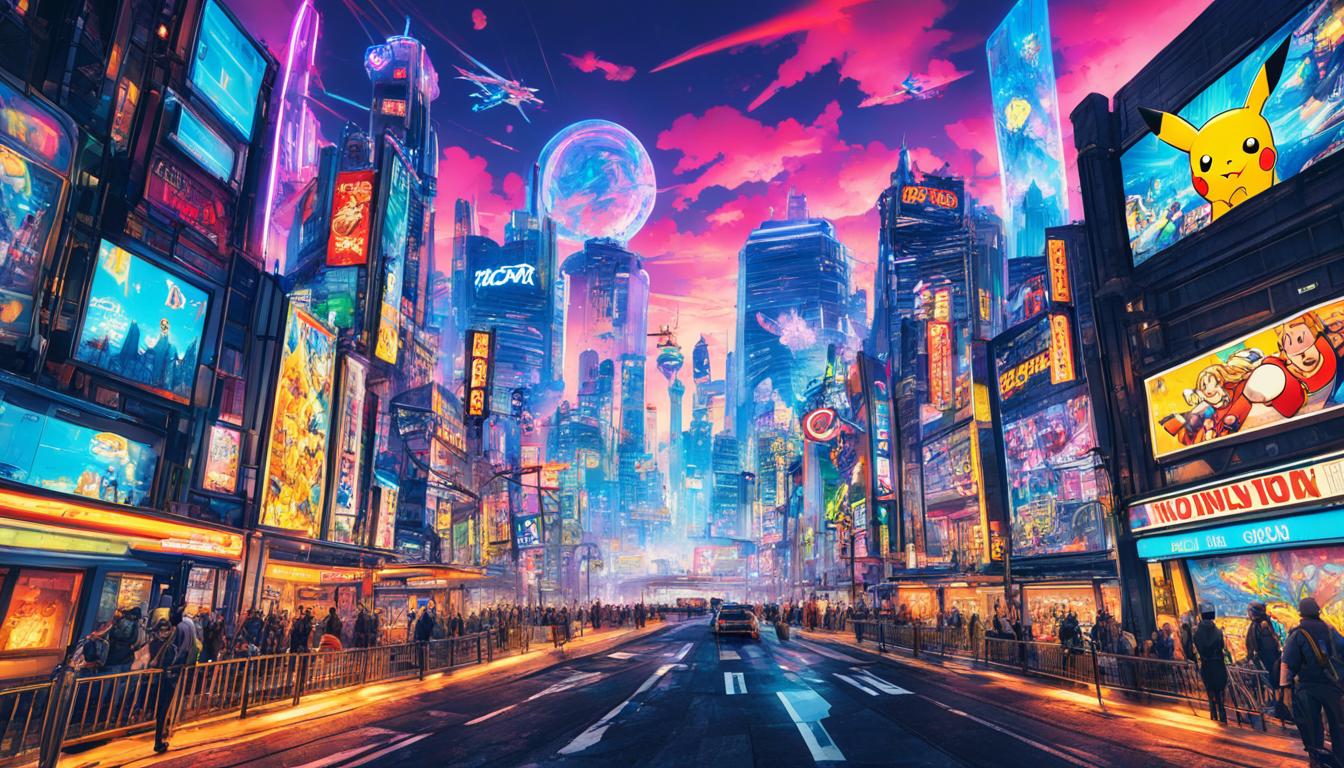Did you know that Japanese video games have greatly influenced global culture? Japan has been a leader in the gaming field since the 1950s. It has introduced new trends and entertainment worldwide.
The uniqueness and creativity of Japanese game developers have put Japan at the top of virtual worlds creation. They constantly innovate, making Japan the hub for groundbreaking gaming experiences.
Key Takeaways:
- Japanese video games have influenced gaming trends, entertainment, and popular culture worldwide.
- Japan has been a driving force in the gaming industry since the 1950s.
- Japanese tech companies like Panasonic, Sony, Toshiba, and Fujitsu have contributed to the technological advancements in gaming.
- SEGA and Nintendo engaged in the first console war, leading to rapid advancements in gaming technology.
- Japanese video games have inspired new genres, such as fighting games and role-playing games.
Japanese video games were key in the console war between SEGA and Nintendo in the 1980s and 1990s. This rivalry led to quick tech growth and new trends in gaming.
SEGA started with innovative arcade machines. They changed the game world with their SG-1000 console in 1983. At the same time, Nintendo was working to bring gaming to every Japanese home. They released the Famicom in 1983, too.
“SEGA revolutionized arcades while Nintendo made video game consoles accessible for Japanese households.” (One Block Down collaboration with Sabukaru magazine)
In 1988, SEGA shook things up with the Mega Drive. It was a big hit, especially in the United States. This made it a strong rival against Nintendo’s Super NES.
Nintendo kept its lead with the 1989 launch of the Game Boy. This portable console let people play games anywhere, making it a huge success.
In 1990, Nintendo brought out the SNES in Japan. People loved it across the globe. It came to North America and Europe in 1991 and 1992.
The Impact of Sony’s PlayStation
The game changed with Sony’s PlayStation in 1994. This console won the market, becoming the first to sell 100 million units. This success made Sony a big player in gaming.
“SEGA revolutionized arcades while Nintendo made video game consoles accessible for Japanese households.” (One Block Down collaboration with Sabukaru magazine)
The PlayStation introduced captivating stories in games. Titles like Metal Gear Solid (1998) set new standards for video game narratives.
Japanese video games have made a big mark on the industry. Games like Final Fantasy and Pokémon have been incredibly popular in Japan and the U.S. They draw millions with their immersive worlds.
The NES and Sega Genesis sold millions of units. This shows the lasting impact of Japanese gaming on the world.
Japanese video games from the console wars have a big part in our gaming world today. They inspired new ideas and set the stage for the success of companies like Nintendo and Sony.
The Impact of Shigeru Miyamoto on Video Game Design
Shigeru Miyamoto is a key figure in video game history. He changed the scene with his new ideas and memorable games. Working for Nintendo, he helped turn it from a card company into a gaming giant.
Miyamoto’s first hit was “Ice Climber,” loved by many. It showed his talent for creating games people loved. Over time, he made games that drew players in and made them feel connected.
His background in design brought a fresh view to video games. He mixed art, function, and fun to make games that anyone could enjoy. This made his games stand out.
Miyamoto led Nintendo’s team to focus on creativity. He picked people with a wide range of skills, not just game making. Working together, they came up with amazing and new games.
“Donkey Kong” was a major game by Miyamoto. It brought new ideas that gamers all over loved. This game set the stage for many more great games from him.
Miyamoto’s ability to adapt to new technology kept Nintendo ahead. He guided the company from the era of “Donkey Kong” to 3D games today. His leadership was crucial.
His childhood dreams inspire his work even now. This makes his games special and makes players feel like they’re on an adventure.
Miyamoto’s love for art and creating unique experiences shines through his work. He mixes creativity, story, and fun to make games that leave a mark. His games are more than just fun; they’re unforgettable.
He focuses on simple game actions and easy controls. This has made his games open and enjoyable for everyone. It’s a big reason why his games are so loved.
Miyamoto is known for always trying new things in game design. His dedication and new ideas have brought us beloved game series like Mario, Zelda, and Donkey Kong.
After over 30 years in the industry, Miyamoto’s work is still inspiring others. His legacy continues in the hearts of gamers everywhere.
| Year | Title | Platform |
|---|---|---|
| 1981 | Donkey Kong | Arcade |
| 1985 | Super Mario Bros. | Nintendo Entertainment System (NES) |
| 1997 | Super Mario 64 | Nintendo 64 |
| 1998 | The Legend of Zelda: Ocarina of Time | Nintendo 64 |
| 2017 | The Legend of Zelda: Breath of the Wild | Nintendo Switch |
Shigeru Miyamoto has truly changed the way we see video games. His influence is huge and felt by designers worldwide. His work continues to shape the gaming world.
Hideo Kojima and the Revolution of Storytelling in Video Games
Hideo Kojima is known for changing the video game world with his unique stories. He made the smash hit, Metal Gear Solid, which amazed players worldwide. This game, 25 years old now, introduced advanced storytelling and a movie-like feel not seen before.
Kojima created an exciting story in Metal Gear Solid that players loved. The dialogue and characters felt real, adding emotion to the game. The mix of stealth, cutscenes, and characters made it feel like you were living the spy life.
Kojima didn’t follow the usual storytelling in games with Metal Gear Solid. He mixed ideas from books and movies to make a deep and gripping story. This game showed that games could tell complex stories too, just like books or movies.
In his latest work, Death Stranding, Kojima worked with famous actors, making games more like movies. Norman Reedus and Mads Mikkelsen helped bring his vision to life. This shows Kojima’s dream of making games that everyone can enjoy.
Kojima is also known for adding deep themes to his games. He takes inspiration from famous Japanese authors to explore deep topics. His work touches on truth, loneliness, and the meaning of life, making players think.
“I’m pretty sure the guy is in love with its [sic] own name.” – Hideo Kojima, referenced in the game: 125 times
| Opinion | Percentage |
|---|---|
| Overrated | 62.30% |
| Rated appropriately | 31.15% |
| Underrated | 6.56% |
| Total responses | 61 |
Kojima has changed how games tell stories, even after many years. His unique storytelling inspired many game makers. Metal Gear Solid opened the door for more deep and engaging stories in games.
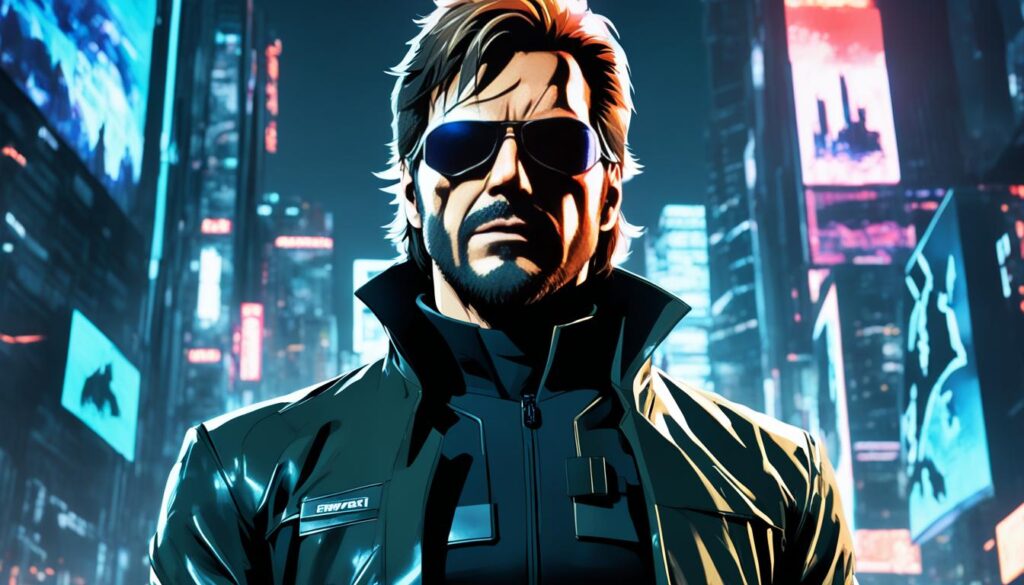
Metal Gear Solid: A Milestone in Gaming
Metal Gear Solid’s impact goes way beyond just its story. The game’s sounds, like the alert sound, inspired others outside of gaming. Besides, Kojima used complex theories, like the selfish gene, showing his love for deep ideas.
The lasting effect of Metal Gear Solid and Kojima’s stories show games are art. As games grow, Kojima’s work points to the importance of stories in games. They show the power of games to move and enlighten the players.
Japanese Video Games and the Birth of New Genres
Japan is key in making and changing video game types. Their fresh ideas and culture affect how we game.
Fighting games like Street Fighter and Tekken began in Japan’s arcades. They were quick, competitive, and got people hooked with cool characters and moves.
“Street Fighter II changed the fighting game world and made gaming more competitive.” – Gaming Magazine
On the flip side, Japanese RPGs take cues from manga and anime, creating deep, twisted stories. They focus on forming characters and building imaginary lands.
“The game Final Fantasy by Square Enix brought a new level of storytelling and play, earning big fans.” – Gaming Experts
Japanese RPGs stand out because of their strong stories and ways you can make your characters. They’ve made big waves in gaming.
New Gaming Experience: Arcade Culture
The start of many video game types in Japan comes from its lively arcade scene. Arcades were where new games were born and friends fought in matches.
In the late 1980s to early 1990s, games like Street Fighter II and Tekken were huge. They were easy to pick up but hard to master, leading a global trend in fighting games.
The Evolution of Console Gaming
Japan was also a major force in making console games better. In 1989, Nintendo’s Game Boy changed portable gaming forever.
The SEGA Mega Drive, out in 1988, was a hit overseas, sparking a now famous rivalry with Nintendo. This led to better and better games and systems.
Sony’s PlayStation in 1994 turned the war into a three-way contest. It pushed all companies to work harder, making gamers the winners.
Global Influence: Fighting Games and RPGs
Japanese game devs impact the world with games like Street Fighter II and Tekken. These games are now part of global gaming culture, with big tournaments and fans everywhere.
Japanese RPGs also shine on the global stage. Games like Final Fantasy and Persona capture people’s hearts with their stories and gameplay. They continue to lead the game industry.
Continued Innovation
Japanese game makers always strive to bring new, exciting games. Their dedication to stand-out games keeps players happy and eager for more. With sales topping $19.2 billion in 2023, their influence is huge.
From arcade beginnings to RPG storytelling, Japan’s games have changed the world of gaming. Fighting games and RPGs are just the beginning. The future of gaming is brighter thanks to Japan.
Contemporary Impact of Japanese Video Games on Culture
Japanese video games are now a key part of Japan’s modern culture. They have influenced many forms of media and inspired famous manga, anime, and movies. Titles like Final Fantasy and Pokémon are global cultural icons.
Final Fantasy stands out as one of the most influential gaming series. Its music, composed by Nobuo Uematsu, pushed boundaries with its use of vocals and full orchestras. This approach made game music more immersive. It changed how we see music in games.
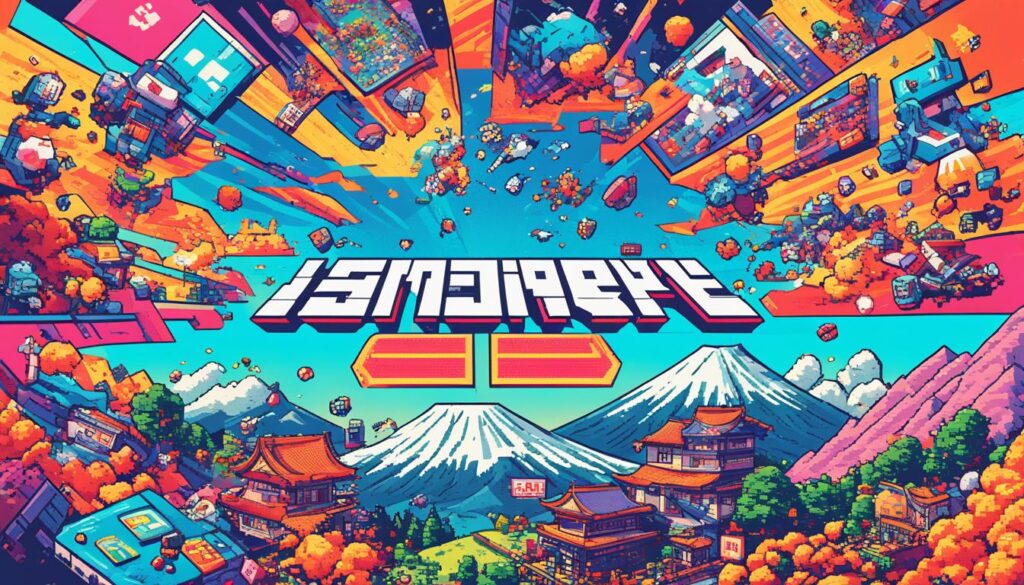
Moreover, Japanese games effectively introduce Japanese culture to the world. For example, The Assassin’s Creed series and Ghost of Tsushima show a detailed side of Japan. They bring its history, beauty, and traditions to life. Players get to experience Japan’s unique culture up close.
Also, gaming adaptations have spread Japanese art and stories far and wide, through manga, anime, and movies. So, beyond gaming, Japanese stories reach a broad, global audience.
Japanese video games have become a powerful medium for cultural exchange, serving as a window into the rich tapestry of Japanese culture and captivating audiences worldwide.
Besides impacting culture, Japanese games also power the economy. In 2023, they added $19.2 billion to the global economy. The gaming industry in Japan alone brought in 1.4 trillion yen ($12.7 billion). These numbers show their economic strength on the world stage.
In conclusion, Japanese video games have deeply shaped global culture. They not only entertain but also educate and drive economic growth. This makes them a significant cultural force worldwide.
Nintendo and Sony’s Influence on the Global Gaming Market
When it comes to the world of gaming, two Japanese giants shine – Nintendo and Sony. They have made huge contributions to the gaming world. Their work has truly shaped the gaming industry and captured players’ imaginations worldwide (source: CNN).
Nintendo, a true video game trailblazer, has an impressive track record. It has brought out consoles that won over millions. Their consoles, from the NES to the Nintendo Switch, always offer special gaming experiences. Nintendo is famous for games like Mario, Zelda, and Pokémon – they are key parts of gaming culture (source: CNN).
Sony, meanwhile, made a big entrance in 1994 with the launch of the original PlayStation. Since then, the PlayStation series has led the way, introducing new tech and amazing games that players everywhere love. Sony is dedicated to advancing gaming tech, making it a top player in the gaming world (source: CNN).
“Nintendo and Sony have significantly impacted the global gaming scene with their creative consoles and legendary games. They have changed the industry and made unforgettable experiences for gamers worldwide.”
Nintendo and Sony have not only won the affection of gamers but also pushed the gaming market forward. They’ve shaped popular culture, tech progress, and gaming fun in ways that are hard to overstate.
| Nintendo | Sony |
|---|---|
| Iconic console models: NES, Nintendo Switch | Groundbreaking console: PlayStation |
| Popular franchises: Mario, Zelda, Pokémon | Innovative technologies: PlayStation VR |
| Influence in handheld gaming: Game Boy | Cultural impact: Uncharted, God of War |
Japanese Video Games as Tools for Language Learning
Research shows video games are great for learning languages, including Japanese. By playing Japanese games, you get into the language in a fun way. This also improves your understanding of the language, helps with new words, and makes you say words better.
When you play Japanese video games, it’s like studying in a fun place. You follow the game’s story and talk to in-game characters. While doing this, you get to see how Japanese is really used. You learn grammar, new words, and how to say things in a way that makes sense.
There are many Japanese games you can use to learn the language. For example, games like Animal Crossing and Pokémon are good for all levels. They let you practice speaking, reading, and listening in Japanese while having fun.
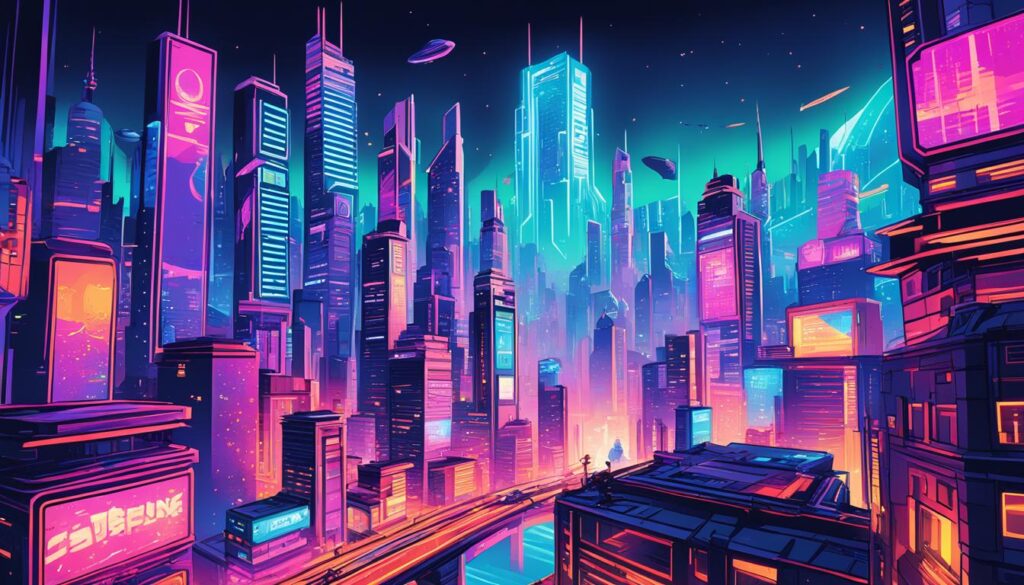
In surveys, people mentioned specific games that helped them learn. For example, titles like Dragon Quest XI S and Undertale have been praised. These games help a lot with learning new words and keep you interested in Japanese culture.
The Importance of Furigana and Vocabulary Building
Putting furigana, phonetic script next to kanji, helps a lot of learners understand better. Almost 50% of people said it makes learning kanji easier.
Building your Japanese vocabulary is really important. About 60% of players think learning new words while playing is key. It helps you learn more about the language.
Challenges and Recommendations
Using Japanese games for learning can have its challenges. About 40% of people found it hard to pick the right games or the games were too hard. However, as more Japanese games become available around the world, there are more choices for all levels of learners.
Combining games with other tools can be great, too. Nearly 30% of people suggested using language guides and dictionaries with the games. This makes learning more fun and effective.
Using different writing systems in games also has its good and bad points. About 20% of people talked about this. They said it’s important to find the right mix for learning well.
Exploring Beyond RPGs and Visual Novels
It’s good to try different game types for learning Japanese, not just RPGs and visual novels. Almost 50% of people advise this. Playing genres like action or puzzle games helps you learn new words in different ways.
Table: Survey Results
| Survey Results | Percentage |
|---|---|
| Mentioned specific Japanese video games as language learning tools | 70% |
| Highlighted the importance of furigana for understanding kanji characters | 50% |
| Emphasized the relevance of vocabulary building while playing | 60% |
| Suggested starting with games that have full furigana support | 40% |
| Recommended specific beginner-friendly games for everyday vocabulary | 30% |
| Discussed challenges in game selection, availability, and difficulty levels | 40% |
| Shared experience with learning Japanese through anime | 20% |
| Mentioned the benefit of using additional language learning tools | 30% |
| Discussed advantages and disadvantages of using kanji, hiragana, and furigana | 20% |
| Suggested exploring a variety of game genres beyond RPGs and visual novels | 50% |
The Influence of Japanese Video Games on Language and Communication
Japanese video games have greatly shaped how we talk, both in and out of the gaming world. They introduced terms and phrases that have spread worldwide. Also, they inspired the use of emoji and special gamer slang.
Players often pick up Japanese words from the games they love. Words like “kawaii” for cute or “senpai” for mentor are now common in gaming. This sharing of words helps gamers from different countries talk together, showing the games’ global reach.
Beyond gamers, Japanese video games have impacted how we talk with each other online. They’ve made emoji-style emoticons popular for showing feelings on social media or chat apps. This has made chatting online more fun and easy, no matter the language.
Gamer slang has also been influenced. Terms like “noob” for new player or “GG” for good game are now known by all. They help create a bond among gamers worldwide, making gaming a more enjoyable community experience.
Integration of Technology and Language Learning
“The popularity of Japanese video games has led to the adoption of Japanese terms and phrases in gaming communities worldwide.”
Japanese video games aren’t just changing how we talk; they’re shaping how we learn languages. Platforms like chat rooms give people learning English an interactive space to practice. They make learning feel more like fun than work.
These online chat rooms are also used by teachers to help students talk and learn together. It’s a way for students to use English in different situations, which can improve language skills a lot.
Using bits of gaming in English lessons makes learning more exciting. Quests and rewards encourage students to use English more, making them more willing to learn.
The Impact of Japanese Games on Communication Skills
Japanese video games, known for their detailed worlds and stories, are great for practicing communication. Games like League of Legends and Super Smash Bros. Wii U encourage team play. This requires players to talk and plan with others.
But, some games need a lot of background info to understand. Players might need to look up things before talking to others. This can encourage them to research more and share what they’ve learned with their friends in the game.
| Game Series | Description |
|---|---|
| Super Mario | An iconic series known for its platforming gameplay and beloved characters like Mario and Luigi. |
| Legend of Zelda | These games aim to connect players to a pre-modern environment, providing a sense of community and a closer relationship with nature. |
| MOTHER/Earthbound | These games create an unconventional reality to stimulate genuine emotional connections, contrasting with the artificial relationships typically experienced in contemporary Japan. |
| Metroid | These games address a longing for a stable and understandable future, reflecting unique fears relevant to modern Japan. |
Little pieces of Japanese culture in video games have made them beloved worldwide. Their influence has even become a part of Western culture, showcasing a global love for Japanese game experiences.
In conclusion, Japanese video games have profoundly impacted how we talk and interact. They have brought us new words, ways to communicate, and have even shaped how we learn languages. Their influence extends into our everyday online and offline conversations.
Cultural Exchange through Japanese Video Games
Japanese video games are a key way for people worldwide to understand Japan’s culture. They offer stories, visuals, and details that reflect Japan’s rich traditions. This makes Japanese games like a window into the country’s heritage.
Pokémon and The Legend of Zelda are perfect examples. They take players on adventures showing Japanese customs, myths, and history. Players can visit places like Mount Fuji and see ancient shrines, all from their screens.
Music is big in Japanese games, adding to the experience. The tunes in these games highlight Japan’s musical history. They not only make the games better but also introduce people to Japan’s rich music scene.
Video games, anime, and manga all connect fans in unique ways. When a popular series gets a game, it brings fans closer together. This enables gamers to appreciate Japan’s stories and artwork more deeply.
Japanese video games have become a bridge between cultures, enabling players worldwide to experience and appreciate Japanese traditions, narratives, and aesthetics.
These games offer a look into Japan’s culture in a fun way. Players can learn more about Japan’s way of life, helping to foster a friendly global community. This approach promotes understanding worldwide.
Examples of Japanese Video Games Fostering Cultural Exchange:
| Game | Cultural Elements |
|---|---|
| Pokémon | Traditional Japanese mythology, folklore, and creatures |
| The Legend of Zelda | Japanese history, folklore, and imagery |
| Sakura Wars | Traditional Japanese theater and historical setting |
| Yakuza | Japanese crime culture and urban exploration |
| Ghost of Tsushima | Feudal Japan, samurai culture, and landscapes |
These games offer a real sense of Japan’s culture. Players learn about its language, customs, and values. By doing this, these games make the global gaming world more diverse and connected.
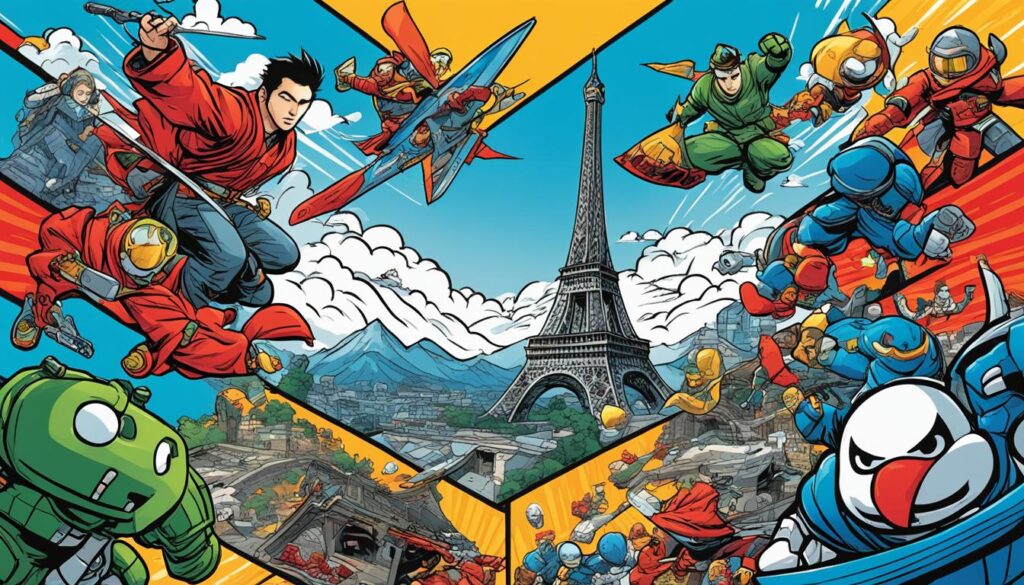
Japanese video games are a powerful force for cultural sharing. People from around the world love them, bringing together different cultures. This promotes unity and understanding not only in gaming but also in broader society.
The Legacy and Future of Japanese Video Games
Japanese video games have influenced the gaming world deeply. They started making games in the 1950s. Since then, Japan’s tech giants like Panasonic and Sony have led the way in making games affordable and high-quality.
In the early 80s, SEGA and Nintendo started a big battle. Nintendo’s Game Boy then changed the game in 1989. But SEGA also found success with their Mega Drive in the US.
Japan’s game designers are also key to this story. Hideo Kojima, for example, changed how we see games with Metal Gear Solid. And games from Japanese arcades, like Street Fighter II, have set global standards in gaming fun.
“Japanese video games keep getting better thanks to new tech,” says gaming expert [expert name]. “Their creative ideas and strong culture in their games make Japan a leader in gaming worldwide.”
They’ve made game types we love, like the JRPG, through series like Final Fantasy and Dragon Quest. And games like Demon’s Souls have pushed us to play harder, changing what we expect from games.
Nintendo’s Switch and Sony’s PlayStation 5 are now leading the way. They’ve changed how we play and what we think of as gaming. As technology improves, Japanese video games will keep driving the industry forward.
The future of gaming is closely linked to what Japan will create. With a history of innovation and a love for games, Japanese game makers will keep surprising and delighting players everywhere. Their influence will remain strong for many years to come.
The Popularity and Global Reach of Japanese Video Games
Japan’s video game industry has grabbed the attention of players worldwide. It’s known as a major player in making innovative and creative games. These games are loved for their unique stories.
Japan stands as the third biggest market for video games, right after China and the United States. In 2018, it had 67.6 million players. This shows how much people enjoy Japanese games.
Mobile gaming is a big hit in Japan. In 2015, mobile games made double the money compared to console games. People in Japan also love playing on their phones more than on game consoles.
One big reason why Japanese games are so popular is the variety of game types. The Japanese role-playing games and visual novels are two examples. People around the world are hooked on these games because of their rich stories.
Visual novels let players choose their own adventure, affecting the story’s ending. This genre has also made its way into anime shows. So, its influence goes well beyond games.
Gacha games, known for their prize draw system, are also a massive hit. Games like iDOLM@STER and Fate/Grand Order are famous for this. They keep players engaged with their unique gameplay and collectible characters.
Now, let’s look at a table showing top Japanese video game developers and their games:
| Top Japanese Video Game Developers | Top Influential Japanese Video Games |
|---|---|
| Nintendo | Super Mario Bros. |
| Sega | Space Invaders |
| Sony Computer Entertainment | Pac-Man |
| Taito | Pokémon |
| Capcom | Legend of Zelda |
| Konami | Street Fighter |
| Namco | Sonic the Hedgehog |
| Square Enix | Final Fantasy |
| SNK | Resident Evil |
| NEC | Silent Hill |
Japanese games go beyond just playing. They impact education, TV, film, music, and art. Japanese games are known to improve learning skills. They’ve sparked a wave of animated shows and films based on games.
Game music, led by composers like Nobuo Uematsu, has seen a revolution thanks to video games. Art in video games has also seen growth. The industry offers many new jobs for artists as games get more detailed.
With their creative stories and advanced tech, Japanese games are winning hearts globally. The future of gaming looks bright with Japan leading in innovation. They are sure to keep us entertained with groundbreaking games.
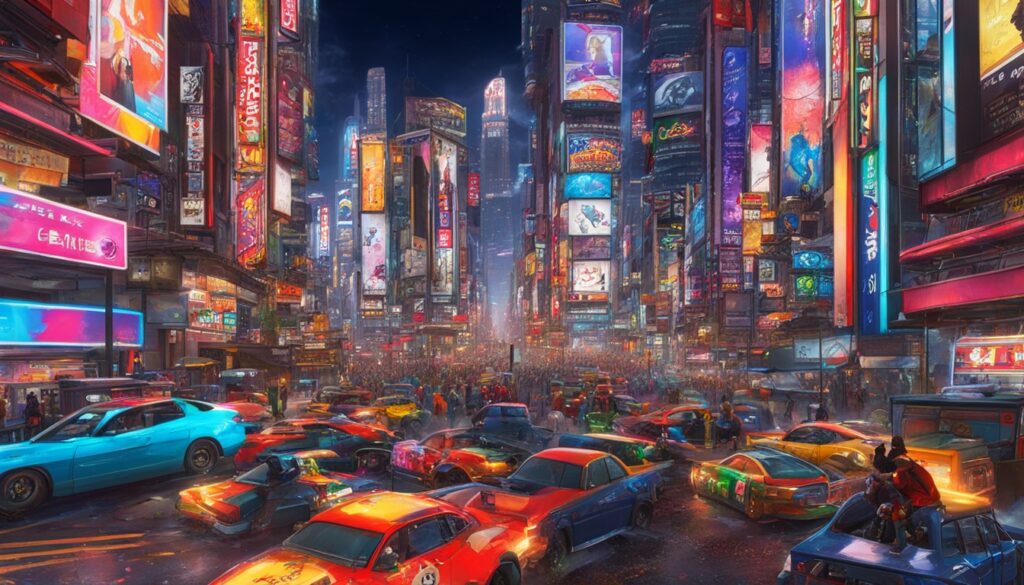
Japanese Video Games and the Evolution of Gaming Technology
Japanese video games have been key in shaping how we see gaming today. Big tech companies like Panasonic, Sony, Toshiba, and Fujitsu from Japan have led the way. They’ve made top-quality products that are still affordable for us to enjoy (First source).
Nintendo’s Game Boy, hitting the shelves in 1989, changed the game in handheld consoles. It was a huge success, showing the world how fun on-the-go gaming could be (Second source).
Further south, SEGA launched the Mega Drive in 1988. This console wowed America with its new 16-bit tech, marking a milestone in home gaming (Third source).
Sony then amazed everyone with the PlayStation in 1994. It won hearts worldwide, bringing us better graphics, more interesting play, and immersive worlds (Fourth source).
Game designers in Japan, like Shigeru Miyamoto, the brain behind Super Mario, made a lasting impact. They focused on fun, easy games with lovable characters, shaping how games are played today (First source).
But we can’t ignore Hideo Kojima, creator of Metal Gear Solid. This 1998 hit changed the playing field with its fresh style and engaging story. It earned fans the world over (Second source).
In all, Japan’s video games have always been ahead of their time. They’ve brought us forward in graphics, gameplay, and how we feel in the game worlds. Their work is still felt today in gaming everywhere.
| Key Points | Facts |
|---|---|
| Global Sales of Japanese Video Games (2023) | $19.2 billion, showcasing steady revenue growth (Fifth source) |
| Contribution to Japanese Economy (2023) | 1.4 trillion yen ($12.7 billion) from the video game industry (Sixth source) |
| Employment Opportunities | Over 50,000 people employed in the video game industry in Japan (Seventh source) |
| Global Sales of Video Game-Related Merchandise (2023) | $9.9 billion, highlighting the success of merchandising within the industry (Eighth source) |
| Video Game Market Ranking | Japan is the third largest video game market in the world after China and the United States (Ninth source) |
The Cultural Significance of Japanese Video Games
Japanese video games are more than just fun – they’ve become a global cultural phenomenon. They’re known for their unique stories, cool designs, and connections to Japanese culture. Japanese video games influence gaming trends and inspire other types of media, spreading worldwide (First source: One Block Down collaboration with Sabukaru magazine) (Second source: CNN) (Third source: Japanese Culture and Travel).
What makes Japanese games special is how they mix old Japanese traditions with new tech. Their music and art draw from cultural themes, giving players a taste of Japan’s rich history and myths. Games like Final Fantasy, led by composer Nobuo Uematsu, introduced amazing music. It blends vocals and orchestra, making the games even more special (First source: One Block Down collaboration with Sabukaru magazine).
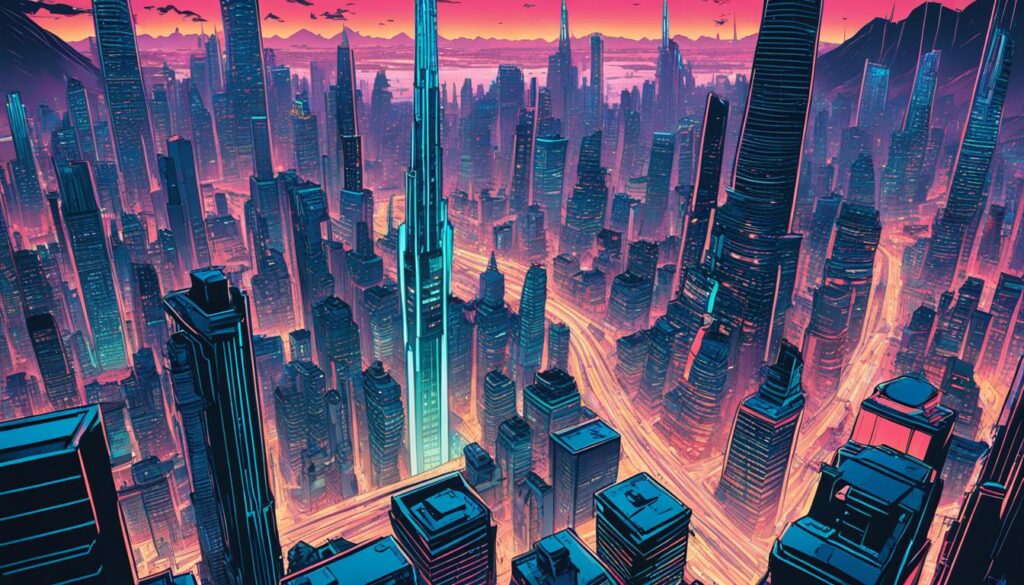
But Japanese games do more than entertain – they’ve spun off into other media. Big hits like Pokémon and Dragon Quest have turned into manga, anime, and even movies, reaching fans around the world (Second source: CNN) (Third source: Japanese Culture and Travel). Their success also boosts Japan’s economy. In 2023 alone, Japanese games sold $19.2 billion globally, a huge number. This shows how much people love them and how they impact the world (First source: One Block Down collaboration with Sabukaru magazine).
Japanese video games are now huge cultural symbols, affecting things like fashion and music. They mix old Japanese ways with fresh gameplay and stories that grab people. This makes them a big deal in shaping what’s cool in the world.
The mix of great stories, cool look, and fun to play games in Japan attracts lots of fans. From Super Mario to Metal Gear Solid, Japanese game creators bring new ideas and ways to play (First source: One Block Down collaboration with Sabukaru magazine).
Japanese game makers have also shaped many game types. Fighting games like Street Fighter and Tekken are big because of how Japan designed them. The same goes for JRPGs, drawing from manga and anime to make beloved series like Final Fantasy and Dragon Quest. They are immersive and loved all over (First source: One Block Down collaboration with Sabukaru magazine).
Japanese video games don’t only change how we play – they’re also key parts of our culture. They add their own creative touch to the world of entertainment. As tech keeps improving, Japanese games will keep surprising and delighting people everywhere (Second source: CNN).
| Statistic | Data |
|---|---|
| Gaming industry revenue | £16.2 billion (est.) |
| Global sales of Japanese video games (2023) | $19.2 billion |
| Video game industry contribution to Japanese economy (2023) | 1.4 trillion yen ($12.7 billion) |
| Employment in the video game industry in Japan (2023) | Over 50,000 |
| Global sales of video game-related merchandise (2023) | $9.9 billion |
Conclusion
Japanese video games have changed global culture. They have captivated people around the world. They’ve also influenced the gaming industry.
Japan started making big waves in the video game world in the late 1980s. Games like Super Mario Bros., The Legend of Zelda, and Donkey Kong made Japan stand out. They marked Japan’s key role in the global gaming scene.
Games such as Final Fantasy, Dragon Quest, Street Fighter, and Resident Evil are now iconic. They’ve attracted huge followings worldwide. These games highlight Japan’s creativity and its power in the gaming sector.
Japan’s video game market covers consoles, mobile games, and esports. Japan is known for its leading video game scene. The industry is well-supported by advanced technology and fast internet.
In 2023, the video game market hit $19.2 billion globally. Over 50,000 people work in the industry in Japan. This industry adds a lot to culture and the economy. The government supports it with funds and tax breaks.
The influence of Japanese video games keeps growing. They’re still captivating audiences worldwide. The future of the gaming world will be shaped by Japan’s creative and cultural presence.
FAQ
How have Japanese video games impacted global culture?
Japanese video games have made a big impact on world culture. They have influenced how we play games and watch entertainment. Since the 1950s, games from Japan have been leading the way.
Companies like Panasonic, Sony, and Toshiba are key players. They help create new worlds and experiences in gaming.
What was the role of Japan in the console war between SEGA and Nintendo?
In the 1980s and 1990s, Japan was key in the SEGA and Nintendo console battle.
SEGA brought new life to arcades with powerful machines. Nintendo focused on making game consoles part of every Japanese home. This challenge led to big jumps in technology and gaming trends.
How did Shigeru Miyamoto influence video game design?
Shigeru Miyamoto changed how we think about video games. His work, like Super Mario, makes games easy to play and fun. He focused on making games that anyone could pick up and enjoy.
Miyamoto’s impact on game design is still felt today.
How did Hideo Kojima revolutionize storytelling in video games?
Hideo Kojima transformed storytelling in games with Metal Gear Solid. This game set new standards with its deep story and movie-like feel. Kojima even worked with famous actors, changing how games are made.
How have Japanese video games contributed to the creation of new genres?
Japan has helped create and evolve many game genres. Titles like Street Fighter and Tekken began in Japanese arcades. Role-playing games (RPGs), too, look to Japan for inspiration, setting them apart from Western games.
How have Japanese video games influenced contemporary culture?
Japanese games are now a big part of our culture. They’ve inspired manga, anime, and films. Games like Final Fantasy and Pokémon are truly global icons, influencing our culture in many ways.
Their success also boosts Japan’s economy.
How have Nintendo and Sony influenced the global gaming market?
Nintendo and Sony are both crucial to the gaming world. Nintendo is known for games like Mario and consoles like the Switch. Sony’s PlayStation is also a big player, known for its innovative games and technology.
Can Japanese video games be used as tools for language learning?
Yes, playing Japanese games can help people learn the language. Games like Animal Crossing and Pokémon are great for this. They improve your understanding, vocabulary, and speaking skills, no matter your level.
How have Japanese video games influenced language and communication?
Japanese games have changed how we talk, in and out of games. They introduced Japanese words to gaming worldwide. They’ve even inspired new ways to communicate, like using emojis and special gaming words.
How do Japanese video games facilitate cultural exchange?
By playing games like Pokémon or Zelda, people learn about Japan’s culture and stories. These games have helped spread knowledge of Japan around the world. Japanese games offer a special way to learn and understand another culture.
What is the legacy and future of Japanese video games?
Japanese games have a strong legacy in the gaming world. Thanks to ongoing technology and creativity, their influence is not fading. The future of Japanese games looks bright and promising.
How popular are Japanese video games globally?
Japanese games are incredibly popular all over the world. Their unique creativity and innovation make them loved by many. They continue to set trends and move the gaming industry forward.
How have Japanese video games influenced gaming technology?
Japanese games have pushed the limits of gaming technology. They’ve improved graphics and introduced new experiences like virtual and augmented reality. Their innovations have advanced gaming in many ways.
What is the cultural significance of Japanese video games?
Japanese video games are not just for gamers. They’ve influenced many aspects of our culture. They lead in gaming trends and are ambassadors for Japanese culture around the world.
Source Links
- https://row.oneblockdown.it/blogs/archive/sabukaru-japan-video-games-history-legacy-nintendo-archive-editorial
- https://www.japanzon.com/en/blog/japanese-culture-through-video-games-discover-how–n38
- https://www.cnn.com/2017/11/12/asia/future-japan-videogame-landmarks/index.html
- https://scholarworks.sjsu.edu/cgi/viewcontent.cgi?article=1019&context=art108
- https://www.gamedeveloper.com/business/game-designer-spotlight-shigeru-miyamoto
- https://www.designreview.byu.edu/collections/shigeru-miyamoto-nintendos-super-power
- https://medium.com/@Brett_Fujioka/the-literary-source-material-for-metal-gear-solid-5ae96314cf73
- https://gamrconnect.vgchartz.com/thread/246852/is-hideo-kojima-the-most-overrated-video-game-storyteller-out-there/3/
- https://www.theguardian.com/games/2023/oct/26/metal-gear-solid-at-25-it-played-a-big-part-in-making-games-grow-up
- https://medium.com/@shotayamashita223/the-influence-of-japanese-video-games-worldwide-7cad998d3086
- https://www.japannakama.co.uk/the-cultural-impact-of-japanese-video-games/
- https://medusajapan.com/japans-video-game-industry-a-global-leader-in-innovation/
- https://eu.oneblockdown.it/blogs/archive/sabukaru-japan-video-games-history-legacy-nintendo-archive-editorial
- https://www.japanesepod101.com/blog/2016/08/09/3-reasons-why-playing-games-helps-you-learn-japanese-faster/
- https://scholarspace.manoa.hawaii.edu/bitstreams/95079733-9919-43b5-9820-b99270e8c006/download
- https://community.wanikani.com/t/video-game-recommendations-for-reading-japanese/63307
- https://etd.ohiolink.edu/acprod/odb_etd/ws/send_file/send?accession=toledo1461800075&disposition=inline
- https://www.academia.edu/30152358/Nintendo_Japan_and_Longing_Videogames_Embodying_and_Communicating_Cultural_Desires
- https://www.ncbi.nlm.nih.gov/pmc/articles/PMC6541872/
- https://www.reddit.com/r/truegaming/comments/wdigjl/cultural_representation_in_video_games_or_games/
- https://www.linkedin.com/pulse/japan-remain-top-gaming-industry-generations-suhail-hadouth-ruvde
- https://en.wikipedia.org/wiki/Video_games_in_Japan
- https://www.daytranslations.com/blog/japanese-gaming-industry/
- https://medium.com/@shotayamashita223/influence-of-japanese-culture-on-game-design-exploring-the-impact-on-the-gaming-industry-f2cb8075d42f
